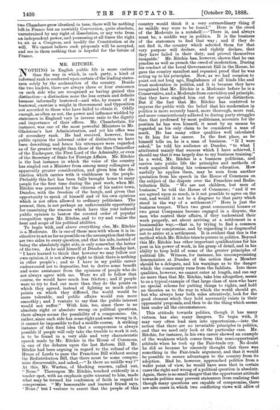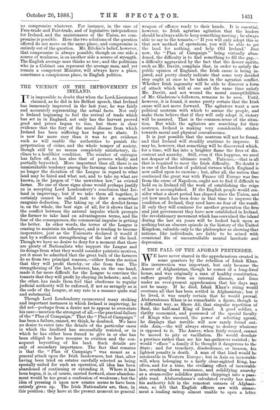M11. RITCHIE.
ATOTHING in English public life is more curious _11.1, than the way in which, in each party, a kind- of informal rank is conferred upon certain of the leading states- men solely by the acclamation of the country. Beside the two leaders, there are always three or four statesmen on each side who are recognised as having gained this distinction—a distinction none the less certain and definite because informally bestowed—and who, by reason of its bestowal, exercise a weight in Government and Opposition not accorded to those who have failed to obtain it. Oddly enough, as often as not, the power and influence wielded by statesmen in England vary in inverse ratio to the dignity and importance of their offices. Mr. Chamberlain, for instance, was one of the- most powerful Ministers in Mr. Gladstone's last Administration, and yet his office was og. secondary rank. ire had received, however, from public opinion the informal order of distinction we have been describing, and hence his utterances were regarded as of far greater weight than those of the then Chancellor of the Exchequer, the First Lord of the Admiralty, or even of the Secretary of State for Foreign Affairs. Mr. Ritchie is the last instance in which- the voice of the country has singled out a Minister from among many colleagues of apparently greater consideration, and given him the dis- tinction which carries with it- visibleness to the people. Probably this fact has been fully brought home to many people for the first time-during the past week, when Mr. Ritchie was presented by the citizens of his native town, Dundee, with the freedom of the burgh, and given that opportunity to speak of himself and of his own opinions which is not often allowed to ordinary politicians. The present, then, is not perhaps an unfavourable opportunity- for examining the reasons which have this year induced' publie opinion to bestow the coveted- order of popular- recognition upon Mr. Ritchie, and to- try and realise the bent and scope of his political abilities. TO begin with, and above everything else, Mr. Ritchie is a Moderate. Ile is one of those men with whom it is in- stinctive to act as far as possible on the assumption that there are two sides to every question, and that his side, instead of being the absolutely right side, is only somewhat the better of the two. As he said himself at Dundee on Monday last, "I have learned to think that however we may follow our own opinion, it is not always tight to think there is nothing in other people's ; and so I have in my public career endeavoured not to dogmatise, but to derive some benefit and some assistance from the opinions of people who do not always agree with me. Were we all to follow that course, we would have much less friction ; and if people were to try to find out more than they do the points on which they agreed, instead of fighting so much about- points on which they differed, the world would be more tolerable, and public affairs would run more smoothly ; and I venture to say that the public interest would not suffer." With him, too, since there is no absolute right or absolute wrong on political questions, there always seems the possibility of a compromise. Or rather, since each side has some right and some wrong init, it cannot be impossible to-find a middle course. A striking- instance of this fixed idea that a compromise is always possible if people will only take the trouble-to work it out, is to be found in a very able and' very characteristic speech made by Mr. Ritchie in the House of Commons, in one of the debates upon the last Reform Bill. Mr. Ritchie had been arguing in- regard to the refusal of the House of Lords to pass- the- Franchise Bill without seeing the Redistribution Bill, that there must be some compro- mise discoverable, and asked—" Is there no middle way ?" At this, Mr. Warton, of blocking renown, called out, " None." Thereupon MT. Ritchie, touched evidently in a tender spot, with an emphasis quite unusual to him, made what may -be termed his confession of faith in regard to compromise. "My honourable and learned friend says, None ;' but I venture to assert that the people of - this country would think it a very extraordinary thing if no middle way were to be found." Here is the creed of the Moderate in a nutshell There is, and always must be, a middle way in politics. It is the business of the statesmen to find that way ; and if they do not find it, the- country which selected them for that very purpose will: declare, and rightly declare, that they have failed in their duty, and proved themselves incapable.' Mr. Ritchie, has, however, shown-that he can practise as well as. preach the creed-of-moderation. During his conduct of the Local. Government Bill. in the House, he gave the country manifest and repeated proof that he was acting up to his principles. Now, as we had occasion to point out not long ago, Englishmen of all kinds like and trust moderation in politics, and it is because they have recognised that Mr. Ritchie is a. Moderate before he is a Conservative, and a Moderate from conviction and principle, that they have singled him out for special distinction. But if the feet that Mr. Ritchie has contrived. to impress the public with the belief that his moderation in. politics is more securely based, more thorough, more real, and more conscientiously adhered to during party struggles than that professed by-most politicians-, accounts for the position. he has won himself, it must by no means be, regarded as his, only claim to be considered a man of mark. He has many other qualities well calculated to fit him for his career. In the first place, as he himself tells us, he is a man of business. "If I were asked," he told, his audience- at Dundee, "to what I attributed mainly that success which I have achieved, I should say that it was largely due to my business training." In a word, Mr. Ritchie is a business politician, and. carries into public life the principles and methods of work aequired during his commercial education. How- usefully he applies them, may be seen from another quotation from his speech in the House of • Commons on the subject of the dispute over- the Franchise and Redis- tribution Bills. "We are not children, but men of. business," he told the House of Commons; "and if we are agreed upon. so much, is it not possible to agree on. the rest, and. would it not be a disgrace to that party which stood in the way of a settlement ?" Here is just the business temper. When two great commercial houses or two great Companies- become engaged in a dispute, the men who control their affairs, if they understand their work properly, set about arriving, at a settlement in a businesslike way,—that is, by trying to find a common ground for compromise, and by regarding it as disgraceful not to arrive at a settlement. It is evident- that this is the- method which Mr. Ritchie tries to pursue in politics. Beyond this Mr: Ritchie has. other-important qualifications for his post in his power of work, in his grasp of detail, and in his ability to keep hold of some of the greater principles of political life. Witness, for instance, his uncompromising - denunciation at Dundee- of the notion that a Member should; be a ,delegate, and. his warnings as to the danger which the community runs-from the faddists- Into these qnalities, however, we cannot enter at length, and can say no more than that Mr. Ritchie, take him altogether, seems to us a typical example of. that large class of men who have no . special scheme for putting things to rights, and. hold no. theories as to the way in which the world should go, but who always hear both sides attentively, look for the good element which they hold necessarily exists in their opponents' proposals, and then to do the thing:which seems best under all the circumstances, This attitude towards politics, though it has many virtues, has also many dangers. To begin with, it may very often lead men into opportunism,—into the notion that there are no invariable principles in politics, and that we need only look at the particular case. Mr. Ritchie,- for instance, in his own career showed an example of the weakness which comes from this semi-opportunist attitude when he took up the Fair-trade cry. No doubt he did so because he sincerely thought that there was something in the Fair-trade argument, and that it would. be possible to secure advantages to the country from its adoption. Had he, however, approached politics from a wider point of view, he would have seen that in certain cases the right and wrong of a political question is absolute. Again, there is no small danger that the opportunist attitude towards politics may prevent statesmen from realising that though many questions are capable of compromise, there are also cases in. which two conflicting views will a,llbw of no compromise whatever. For instance, in the case of Free-trade and Fair-trade, and of legislative independence for Ireland, and the maintenance of the Union, no com- promise is possible. Here the two solutions of the question offered do not move on the same plane, and compromise is entirely out of the question. Mr. Ritchie's belief, however, that compromise is always possible, though on one side a source of weakness, is on another side a source of strength. The English average man thinks so too ; and. the politician who in a Cabinet can represent the average man, and yet remain a competent Minister, will always have a place, sometimes a conspicuous place, in English politics.



































 Previous page
Previous page